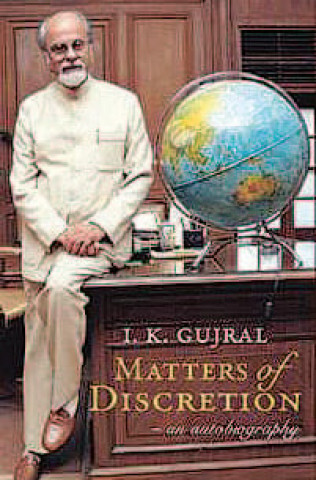Book review: Dishing the dirt
Matters of Discretion is a window into the world of Indian politics.

Matters of Discretion does justice to its title. It gives you all the ‘dirt’ you need on Indira Gandhi: her chameleonesque attitude, her haughty demeanour and backstabbing politics. Describing her as having a very complex personality, he writes, “One day she would write to me as ‘Dear IKG’ or ‘My dear Inder,’ and just a day later it would be ‘Dear Shri Gujral’[...] It was all a question of her moods.”
He also talks at length about the time of the “Sanjay-led junta”— that is, how Indira Gandhi’s younger son marred her government with his bad-boy behaviour and parochial politicking. I never really quite understood the relationship between Mrs Gandhi and her son, but here it is clearly spelled out: “Where Sanjay was concerned, Indira Gandhi was not ready to listen to anyone. Yes, no one! Not even at the cost of the nation that she governed.”
India’s skyrocketing corruption, the vengeful, squabbling politics and the tumultuous ‘80s and ‘90s are chronicled in the book, which has a ‘Dear Diary’ feel to it — in a positive way.
More than anything, the book changed my opinion about IK Gujral as a statesman. I had always thought of him to be a weak politician, a people pleaser, a sycophant. This opinion was reinforced when I read the book’s opening chapters, with his eulogy of Pandit Jawaharlal Nehru and him being part of Mrs Gandhi’s “kitchen cabinet”. However, as I read on, I realised that he chose to eschew the ‘evils’ around him, which made him look weak. He chose tolerance instead of confrontation. Even in his key position as the Indian ambassador to the USSR, he worked honourably — he even tolerated the KGB’s incessant bugging and phonetaps!
The best part: the autobiography exudes honesty. He writes of his embarrassing moments, how he tried to keep his chin up but sometimes failed, the rupee plunge that was unfortunately attributed to him and the factional politics of India that ultimately led to his resignation from office.
More than just politics, Matters of Discretion is a revelation about IK Gujral , his parents and his wife’s fervent participation in the freedom struggle of 1947. More delightful is reading about his friendship with Faiz Ahmed Faiz and Krishan Chandar, his Urdu ‘red’ poetry; and him being a Bhagat Singh follower, rather than Gandhi’s.
More than just a memoir, it’s a man’s evolution, from a firebrand young Communist to a democratic leader.
Published in The Express Tribune, Sunday Magazine May 22nd, 2011.



















COMMENTS
Comments are moderated and generally will be posted if they are on-topic and not abusive.
For more information, please see our Comments FAQ